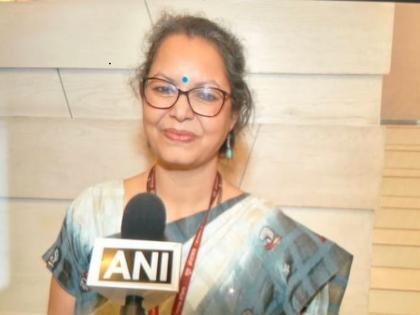India needs industry-academia alliance to power India's chip revolution: MeitY Scientist Sunita Verma
By ANI | Updated: November 17, 2025 20:05 IST2025-11-17T20:01:41+5:302025-11-17T20:05:03+5:30
New Delhi [India], November 17 : India's semiconductor ambitions hinge on deeper collaboration between industry and academia, a shift ...

India needs industry-academia alliance to power India's chip revolution: MeitY Scientist Sunita Verma
New Delhi [India], November 17 : India's semiconductor ambitions hinge on deeper collaboration between industry and academia, a shift that MeitY believes is essential to turn the country's strong design talent into fully indigenous chip products, Sunita Verma, Scientist-G and Group Coordinator at MeitY, toldtoday.
"We do realise that with this talent we don't have any Indian end-to-end product. We cannot claim the entire product is ours. Our designers were working in various companies," Verna toldon the sidelines of the 8th Electronics Summit in New Delhi.
She also called for a united national push to build full-stack semiconductor products and highlighted the urgency of moving beyond fragmented contributions to global design houses.
Stressing the need for industry participation, she added, "There is a trust from the DCA also, industry is approaching to utilise the funds so the complex chips should be taken up for development. We are all behind this."
The government, she noted, is expanding support mechanisms through the semiconductor mission and the design-based incentive framework. These initiatives focus on "creating infrastructure, providing IT support, and financial support" to enable domestic designers and startups to mature their ideas into products.
Verma highlighted the depth of India's academic pipeline as a key asset, saying, "We are supporting academia in the last 30-35 years," which has enabled strong capacity building for chip design across institutions.
A major boost to industry-led innovation is coming from the newly launched R&D and Innovation (RDI) Scheme, which offers long-term loans to startups working on advanced chip development.
She said this mechanism addresses long-standing gaps, especially as "Funding from the industry in R&D was not adequate." The RDI scheme, she noted, is helping companies take on technologically complex chips that require sustained investment.
She also cautioned that India must adopt a market-first approach: "Identify the users and sell the idea and then start manufacturing," instead of developing products without assured demand.
In the broader context of India's semiconductor mission, Verma outlined the need to identify products "from the market low volume high quality or vice versa," depending on strategic priorities.
She emphasised aligning with industry to accelerate Made-in-India chip development and said mandating the use of indigenous products in select areas could strengthen domestic manufacturing.
The government, she added, is committed to supporting companies that step into deeper technology layers and contribute to national capability building.
Later, participating in a panel discussion, Verma joined experts in deliberating on promoting fabless chip design, hardware-software co-design, incentivizing IP creation, expanding access to EDA tools, rapid prototyping, and strengthening industry-academia partnerships. The panel also stressed the importance of integrating startups into the design and development value chain and ensuring effective utilisation of the RDI scheme.
Disclaimer: This post has been auto-published from an agency feed without any modifications to the text and has not been reviewed by an editor
Open in app